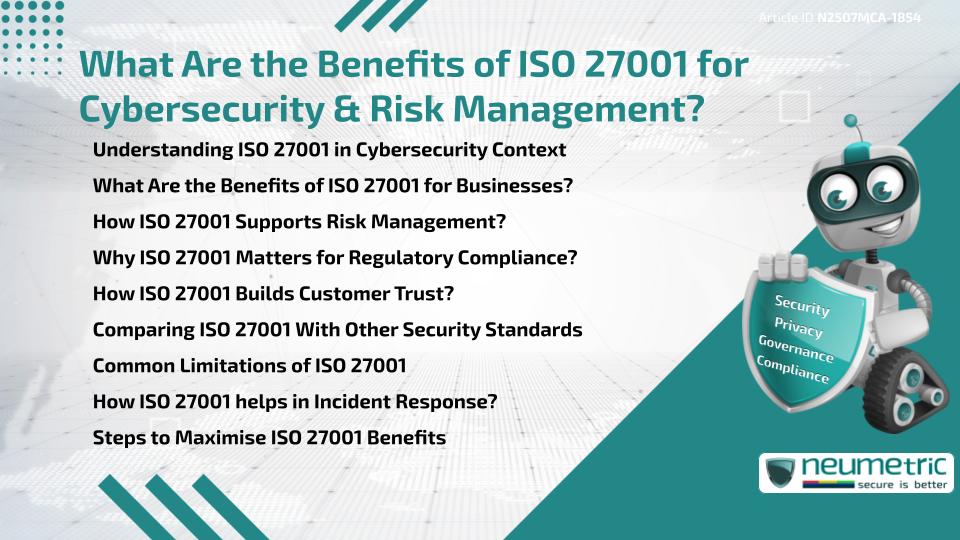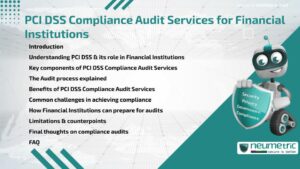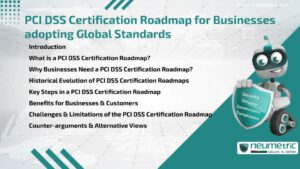Table of Contents
ToggleIntroduction
In a digital landscape where data breaches & security Threats continue to rise, Organisations must adopt robust standards to protect sensitive information. ISO 27001, the international Standard for Information Security Management System [ISMS], offers a proven Framework to help businesses secure their digital assets. But what are the advantages of ISO 27001? This article explores how ISO 27001 strengthens Cybersecurity, streamlines Risk Management & supports Regulatory Compliance for Organisations of all sizes.
Understanding ISO 27001 in Cybersecurity Context
ISO 27001 is published by the International Organisation for Standardization [ISO] & the International Electrotechnical Commission [IEC]. It offers a structured method for protecting an organisation’s sensitive data by ensuring it stays confidential, intact & accessible only to the right people. The Standard focuses on identifying Potential Threats, implementing Risk-based controls & establishing Continuous Improvement processes.
Organisations across industries—such as Finance, Healthcare & Technology—leverage ISO 27001 to structure their Information Security strategies & align with international Best Practices.
What Are the Benefits of ISO 27001 for Businesses?
So, what are the benefits of ISO 27001 that make it valuable for modern enterprises?
- Improved Information Security Posture: It helps Organisations identify Risks & apply controls to reduce the Likelihood of data breaches.
- Reputation Protection: A certified ISMS helps prevent incidents that could damage brand image & Customer Trust.
- Operational Efficiency: By standardising processes & security responsibilities, ISO 27001 reduces redundancy & promotes accountability.
These outcomes collectively support an environment of proactive security & long-term resilience.
How ISO 27001 Supports Risk Management?
At the heart of ISO 27001 lies effective Risk Management. Organisations are required to conduct thorough Risk Assessments to identify Vulnerabilities in their systems & business processes. Based on the results, appropriate controls are selected from Annex A of the standard.
This Risk-based approach is not only systematic but also flexible. It allows companies to tailor their ISMS according to business needs & Threat landscapes.
Why ISO 27001 Matters for Regulatory Compliance?
Many regulations such as the General Data Protection Regulation [GDPR] or the Health Insurance Portability & Accountability Act [HIPAA] demand strong Data Protection practices. ISO 27001 helps meet regulatory requirements by integrating Privacy & Security controls into day-to-day business operations.
While ISO 27001 Certification itself is not legally required, it simplifies demonstrating due diligence to auditors, regulators & partners.
How ISO 27001 Builds Customer Trust?
Customers, especially in B2B markets, want assurance that their data is in safe hands. Earning ISO 27001 certification demonstrates that an organisation is committed to robust information security practices. It shows a commitment to Data Protection, ongoing Audits & Continuous Improvement.
This certification often gives companies a competitive advantage during procurement or contract negotiations.
Comparing ISO 27001 With Other Security Standards
Although ISO 27001 is a widely accepted international standard, it is not the only available security framework. Other options are:
- SOC 2: More popular in North America, especially for SaaS companies.
- NIST Cybersecurity Framework: Widely used in U.S. federal agencies & critical infrastructure.
- PCI DSS: Specific to Payment Card Industry Data Protection.
What are the benefits of ISO 27001 compared to these? ISO 27001 offers broader applicability across industries & geographical regions due to its structured, adaptable approach.
Common Limitations of ISO 27001
Despite its strengths, ISO 27001 is not a silver bullet. Some limitations include:
- Time & Cost of Certification: Achieving & maintaining certification requires investment in both time & resources.
- Scope Limitations: If the ISMS scope is too narrow, critical areas may remain unprotected.
- Cultural Resistance: Employees may resist new procedures or additional documentation requirements.
Understanding these drawbacks is essential for realistic expectations
How ISO 27001 helps in Incident Response?
An effective Incident Response Plan is a key part of ISO 27001 implementation. Organisations must prepare for & respond to Security Incidents in a timely & documented manner.
This leads to quicker recovery, less damage & improved transparency with Stakeholders.
Steps to Maximise ISO 27001 Benefits
To make the most of ISO 27001, businesses should:
- Define a Broad ISMS Scope: Include all departments & information assets.
- Invest in Employee Training: Raise awareness & reduce human error.
- Perform Regular Internal Audits: Continual evaluation ensures effectiveness.
- Engage Top Management: Leadership involvement drives accountability.
Following these steps not only improves outcomes but also answers the question: what are the benefits of ISO 27001 when well-executed?
Conclusion
ISO 27001 is more than a certification—it is a strategic tool for managing Cybersecurity Risks. It provides a structured approach to protecting information assets, improves trust with Stakeholders & helps meet regulatory requirements. Organisations that effectively implement ISO 27001 can strengthen their overall security culture & minimise the impact of Cyber Threats.
Takeaways
- ISO 27001 provides a globally accepted Framework for Information Security.
- Its Risk-based approach helps Organisations proactively manage Threats.
- It aligns with multiple regulatory requirements like GDPR & HIPAA.
- Certified Organisations enjoy greater Customer confidence & operational discipline.
- Despite limitations, its structured method offers long-term Cybersecurity benefits.
FAQ
What are the benefits of ISO 27001 for Small Businesses?
It helps Small Businesses create a clear security structure, often resulting in fewer incidents & better Client confidence, especially in competitive markets.
What are the benefits of ISO 27001 when it comes to Audits?
It simplifies both internal & Third Party Audits by standardising processes & documenting Risk treatment procedures, saving time & reducing errors.
What are the benefits of ISO 27001 for Compliance?
ISO 27001 helps meet the requirements of multiple laws & regulations by embedding Privacy & Security Controls into day-to-day operations.
What are the benefits of ISO 27001 for Data Protection?
It provides a systematic Framework to identify, control & reduce Risks to personal & sensitive information.
What are the benefits of ISO 27001 during business expansion?
It ensures consistent security practices across departments or locations, making it easier to scale operations securely.
What are the benefits of ISO 27001 if you are a SaaS provider?
It builds Customer Trust, improves internal processes & can act as a key differentiator in Vendor evaluations.
What are the benefits of ISO 27001 for managing Third Party Risks?
It encourages businesses to assess & manage Risks arising from Vendors & partners through contractual & procedural controls.
Need help?
Neumetric provides organisations the necessary help to achieve their Cybersecurity, Compliance, Governance, Privacy, Certifications & Pentesting goals.
Organisations & Businesses, specifically those which provide SaaS & AI Solutions, usually need a Cybersecurity Partner for meeting & maintaining the ongoing Security & Privacy needs & requirements of their Clients & Customers.
SOC 2, ISO 27001, ISO 42001, NIST, HIPAA, HECVAT, EU GDPR are some of the Frameworks that are served by Fusion – a centralised, automated, AI-enabled SaaS Solution created & managed by Neumetric.
Reach out to us!





